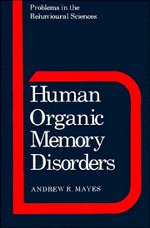Book contents
- Frontmatter
- Contents
- Acknowledgements
- 1 Healthy and pathological memory: the underlying mechanisms
- 2 The assessment of memory disorders
- 3 Disorders of short-term memory
- 4 Disorders of previously well-established memory
- 5 The memory problems caused by frontal lobe lesions
- 6 Organic amnesia
- 7 Animal and biochemical models of amnesia
- 8 Less well-characterized memory disorders
- 9 Overview
- Glossary
- Bibliography
- Index
2 - The assessment of memory disorders
Published online by Cambridge University Press: 01 June 2011
- Frontmatter
- Contents
- Acknowledgements
- 1 Healthy and pathological memory: the underlying mechanisms
- 2 The assessment of memory disorders
- 3 Disorders of short-term memory
- 4 Disorders of previously well-established memory
- 5 The memory problems caused by frontal lobe lesions
- 6 Organic amnesia
- 7 Animal and biochemical models of amnesia
- 8 Less well-characterized memory disorders
- 9 Overview
- Glossary
- Bibliography
- Index
Summary
People may do badly at different kinds of memory tasks, and they may do so for different reasons. It is the purpose of memory assessment to ascertain the ways in which a subject's memory is poor and the causes of this poor performance. Clinicians need such assessments to help them see how patients will cope in everyday life, what their prognoses are, whether there are any therapies to which they are likely to respond, and whether there is any response to treatment. Theoreticians are most concerned with identifying the range of memory disorders and their specific causes. Both groups need valid, reliable tests of particular kinds of memory for which normative data exist so that the severity of the deficits can be determined. But whereas clinicians need tests that tap everyday memory performance, which exist in several equivalent forms, theoreticians need standardized tests with normative data so that results from different laboratories can be compared. Furthermore, as theoreticians seek to identify new kinds of memory disorder, they need to develop their own special-purpose tests to compare the performance of a patient on these tests with that of a group of matched control subjects. The theoretical aim is to identify elementary memory deficits that cannot be subdivided into further simpler disorders and to see what, if any, kinds of brain damage cause them.
The problem that the theoretician faces is that most memory disorders are messy, are poorly understood, and involve several kinds of elementary memory breakdown that arise for many reasons.
- Type
- Chapter
- Information
- Human Organic Memory Disorders , pp. 36 - 54Publisher: Cambridge University PressPrint publication year: 1988



